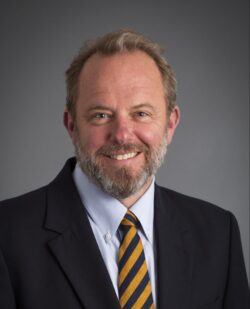Researchers identify ways to improve emergency care for people living with dementia
A new collection of research papers sets out priority areas to better provide emergency care for people living with dementia in the United States.
Erik Ranheim, MD, PhD, an academic physician with a distinguished record of achievement in medical education, will be the next chair of the University of Wisconsin School of Medicine and Public Health’s Department of Pathology and Laboratory Medicine.
Ranheim has been a faculty member for nearly two decades and has served as vice chair of education for the department since 2011. A highly respected leader with multi-faceted expertise, he has served in several leadership capacities in the school’s medical education curriculum. From 2007-2015, he directed the department’s residency program. His research focuses on the fundamental processes underlying immunity and the application of those principles to understanding the development of leukemia and lymphoma and potential immunotherapies for a variety of cancers.
“I am humbled, honored, and excited to lead an extraordinary group of clinicians, researchers, teachers, and staff,” Ranheim says. “I have been deeply committed to our department, UW–Madison, and the greater Madison community for nearly 20 years, and look forward to pursuing excellence in all of our missions in a healthy and welcoming departmental environment.”

Pathologists, technical, and professional staff in the department are at the forefront of diagnosing disease and ensuring proper treatment for patients, providing laboratory medicine services in anatomic pathology and clinical pathology for eight hospital and clinic-based laboratories. Anatomic pathologists in the department process 60,000 surgical and hematopathology specimens and 30,000 cytologies per year, and perform forensic and medical autopsies. Clinical pathologists and laboratory medicine staff conduct more than 3.8 million laboratory tests annually, analyzing bodily fluids such as urine, blood, plasma, and saliva using state-of-the-art technology.
The department is also home to a vibrant research portfolio and is ranked 16th in the nation for funding from the National Institutes of Health. Researchers have focused on topics including the immunology of infectious diseases, neuroimmunology, Alzheimer’s disease, cancer, glaucoma, and hematopoietic stem cells.
Ranheim completed his undergraduate degree at the University of Pennsylvania, followed by a PhD in immunology and MD at the University of Minnesota. He completed his residency training in anatomic pathology, fellowships in hematopathology and autopsy, and postdoctoral research fellowship at Stanford University.
Ranheim received the school’s Dean’s Teaching Award and a Team Science Award from the Society for the Immunotherapy of Cancer. He has also been named Physician Citizen of the Year by the Wisconsin Medical Society, among other honors.
His background as a clinician, educator, and researcher with a systems-level view makes him highly qualified to step into this role, says Robert N. Golden, MD, dean of the UW School of Medicine and Public Health.
“Dr. Ranheim is a deeply respected leader in our school and academic health system,” he said. “It is exciting to see him step into this important leadership role. He understands the remarkable synergies that are created through the integration of our research, education, and clinical missions.”
Ranheim’s appointment will be effective in mid-August.